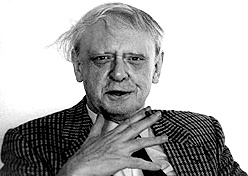John Anthony Burgess Wilson foi um escritor, compositor e crítico britânico.
Prolífico e controverso, grande parte da sua obra ainda permanece no anonimato, sendo lembrado principalmente pelo décimo oitavo livro, Laranja Mecânica . Seus livros, críticas e resenhas são marcados por grande sátira social. James Joyce — de quem Burgess era admirador e estudioso — é considerado a mais marcante influência no trabalho de Anthony Burgess.
Burgess cedo ficou órfão de mãe, vítima da gripe espanhola. O pequeno John foi, desde então, criado por uma tia e, mais tarde, pela madrasta. Estudou literatura e língua inglesa na Universidade de Manchester. Foi compositor, serviu por seis anos ao exército inglês na II Guerra Mundial e tornou-se oficial na Ásia e, mais tarde, professor, trabalhando inclusive para o Ministério de Educação na Malásia. Com a luta pela independência da Malásia o deixando desempregado e tendo sido diagnosticado com um doença fatal, Burgess entrou em frenesi literário em 1959, preocupado em deixar sua esposa sem recursos financeiros. A previsão médica estava errada. Ele viveu até 1993, enquanto sua esposa, Llwela Isherwood Jones, morreu de cirrose hepática em 1968. No mesmo ano, Burgess casou-se com Liliana Macellari, uma linguista e tradutora italiana, com quem conviveu até sua morte.
A mais célebre fábula de ficção científica de Anthony Burgess, "Laranja Mecânica", é um libelo pelo livre-arbítrio. Burgess preocupava-se com a ampla utilização do behaviorismo em clínicas, consultórios e prisões. O aumento a delinquência juvenil tanto no Ocidente capitalista quanto na Rússia soviética foi outro catalisador do livro cuja língua, inclusive, é um inglês russificado, de gírias abundantes. O autor retornou ao tema de Laranja Mecânica em Enderby Outside e A Clockwork Testament, or Enderby's End , livros que tiveram fria acolhida.
Wikipedia
✵
25. Fevereiro 1917 – 22. Novembro 1993
